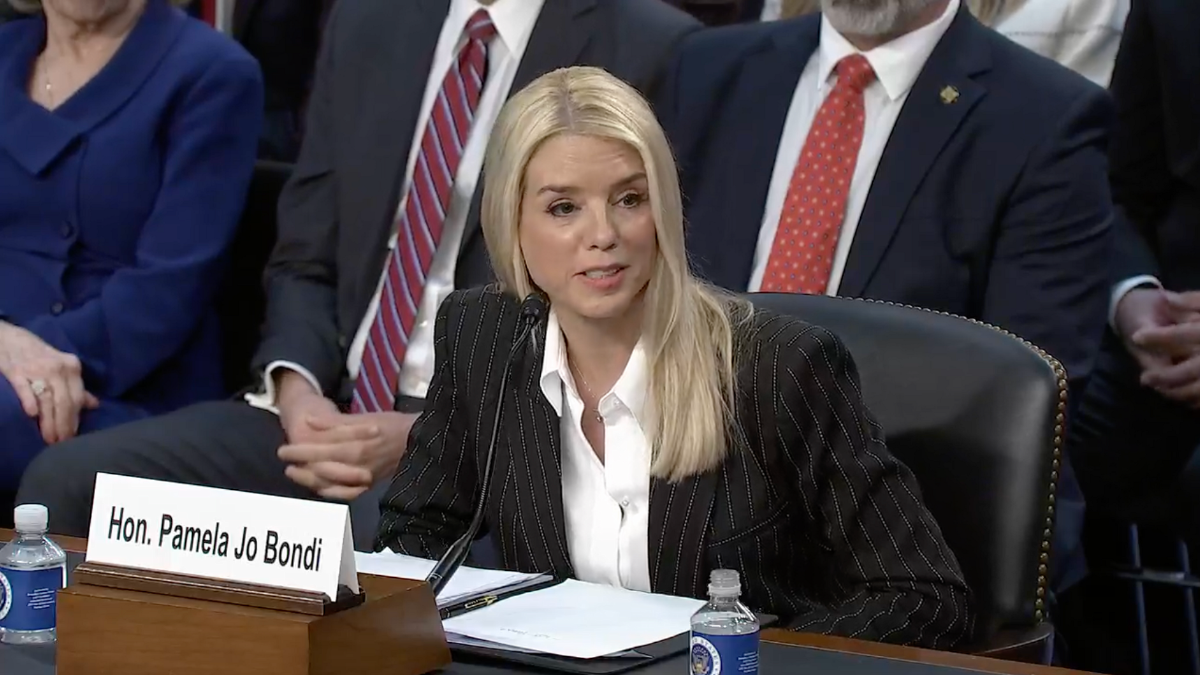Tech Policy Takeaways From Last Week’s Senate Confirmation Hearings
Andrew Serulneck / Jan 21, 2025
Washington, DC - January 15, 2025: Pamela Jo Bondi answers questions during a Senate confirmation hearing following her nomination to be Attorney General of the United States. Source
Senate confirmation hearings last week for key officials appointed by President Donald Trump offered some insights into the potential trajectory of US technology policy. Nominees for roles such as Attorney General, Secretary of State, Energy Secretary, and Secretary of Defense addressed a range of questions on key issues, from antitrust actions against Big Tech to bolstering the electrical grid and securing access to the minerals that power the devices of the digital age. These exchanges gave some insight into the incoming administration's potential posture on tech and signaled the priorities of lawmakers.
Bondi Indicates Support for Pursuing Antitrust Investigations
The Biden administration sought to combat anti-competitive behavior in the tech industry, bringing antitrust cases against large firms like Google, Apple, and Meta for alleged monopolistic business practices. At former Florida Attorney General Pam Bondi’s confirmation hearing for Attorney General, Senator Amy Klobuchar (D-MN) asked Bondi for assurances that the Department of Justice would continue the antitrust lawsuits against large tech firms under Bondi’s leadership. Bondi confirmed that they would.
Bondi admitted that she doesn’t specialize in antitrust law but pointed to the nomination of Gail Slater – Trump’s pick to serve as Assistant Attorney General for the Department of Justice’s Antitrust Division – as evidence of the next administration’s commitment to aggressive antitrust enforcement. Slater is a career public servant with a reputation as an antitrust hawk. Slater served as an economic adviser to Vice President JD Vance, who called for the break up of Google and praised Federal Trade Commission (FTC) Chair Lina Khan for her work going after Big Tech under the Biden administration.
Bondi Questioned About Section 702 of the Foreign Intelligence Surveillance Act (FISA)
Bondi was asked by Sen. John Cornyn (R-TX) whether she would enforce Section 702 of the Foreign Intelligence Surveillance Act (FISA). Section 702 is a controversial provision of the FISA Amendments Act of 2008 that permits the government to conduct targeted surveillance of foreign persons located outside the United States through the compelled assistance of electronic communication service providers.
Proponents of the law support it because the information gathered is ostensibly used to protect the country from threats like terrorism and cyberattacks. Critics argue it infringes upon peoples’ civil liberties by allowing the US government to engage in mass, warrantless surveillance.
If confirmed as Attorney General, it would be Bondi’s job to work with the Director of National Intelligence to identify the types of information to collect and then compel electronic communication service providers to hand over texts, emails, and other electronic communications to the government. Senator John Cornyn (R-TX), a vocal supporter of Section 702, pressed Bondi to state on the record that she would enforce the law as it was written.
“Senator, I haven’t read the entire [Section] 702 memo in front of you,” responded Bondi, “but I will commit to reading that and doing everything I can to keep America safe again.”
“Of course you will,” said Cornyn impatiently.
Section 702 of FISA is up for reauthorization by Congress in 2026. Congress can also choose to amend the law or allow it to sunset.
Sen. Graham Raises Prospect of Section 230 Reform
During Bondi's confirmation hearing, Sen. Lindsey Graham (R-SC) voiced his support for repealing or amending Section 230 of the Communications Decency Act.
"We're all trying to figure out how to empower victims of social media," Sen. Graham said. He added, "My goal is to either repeal Section 230 or replace it with a system that better supports consumers who have been harmed. Do you agree with that?" Bondi agreed, expressing her concern and a commitment to revisiting the issue with him.
“I'm committed to looking at that with you,” Bondi told Sen. Graham. “There are so many issues online… that that's one of the things we have to find, things that can bring us together now and this has to be one of them.”
Use of Artificial Intelligence In the US Military Set to Increase
President Trump’s nominee for Secretary of Defense, Pete Hegseth, highlighted the crucial role of artificial intelligence (AI) in maintaining America’s military dominance in his responses to the Senate Armed Services Committee’s advanced policy questions (APQs). Although he didn’t elaborate much on this topic during his confirmation hearing, his written answers submitted to Congress before his testimony reveal a strong focus on AI investment.
“The Department of Defense budget must focus on lethality and innovation; technology is changing the battlefield,” Hegseth wrote, emphasizing the importance of AI in modern warfare. Hegseth repeatedly underscored his goal to “make the United States military a warfighting-centric organization once again,” particularly in the context of potential conflicts with China. “Artificial Intelligence is a powerful set of capabilities that we must use, as we know our adversaries, particularly China, have invested in such capabilities,” he stated. He also pointed out the advanced state of AI in the US commercial sector and its potential to benefit the Department of Defense (DoD). “Artificial Intelligence in the US commercial sector is the most advanced in the world, and we should take advantage of that as a basis for DoD’s specific needs,” he added.
Hegseth identified the Pentagon’s Chief Digital and AI Office (CDAO) as one department that would see an increased role under his leadership. “If confirmed, I will commit to bringing modern management tools to the Department that allow my team to manage effectively with agility. This will include the application of AI/ML capabilities, modernizing decision support tools from the boardroom to the battlefield, and further developing promising capabilities,” he wrote in his response.
Hegseth pledged to prioritize AI for various military applications, including monitoring cyberspace, countering transnational criminal organizations, and enhancing weapons testing and evaluation functions, underscoring his belief that AI capabilities are critical to the Defense Department’s future success.
Expansion of the Electrical Grid Set to be a Priority
Demand for electricity is expected to rise by 15% over the next five years, driven by advances in generative artificial intelligence, increased manufacturing investments, and the expanding use of cryptocurrency in the American economy. Data centers powering generative AI and cryptocurrency mining, which require continuously running powerful hardware, are known to consume significant amounts of energy.
Senators are aware of the potential for these energy-intensive technologies to bring jobs and investment to their states. Consequently, they are eager to ensure that the nation’s energy infrastructure is prepared to support this growth. However, these technologies also raise serious environmental concerns.
That’s why the nomination of Chris Wright to head the Department of Energy – a fossil fuel executive who has argued in the past that “there is no climate crisis” – was met with some hostility, such as by Senator Alex Padilla (D-CA), whose constituents are currently facing severe wildfires that scientists have said were made more destructive due to climate change. Wright has also been critical of renewable energy sources like wind and solar, arguing that they are not significant contributors to decarbonization.
During his confirmation hearing, Wright addressed concerns that the incoming administration’s plans to increase energy production would discount the threat of climate change, saying, “I've studied and followed the data and the evolution of climate change for at least 20 years now. It is a global issue. It is a real issue. It's a challenging issue, and the solution to climate change is to evolve our energy system… Energy and climate is a global problem, but America should be the leader and I think President Trump is firmly aligned with that position as well.”
While Wright often defends fossil fuel production – he once drank fracking fluid to prove it was safe – the nominee for Energy Secretary has demonstrated a commitment to developing other forms of energy. Besides oil and natural gas, Wright has experience working with solar and wind. He also pursued investments in nuclear and geothermal power through his firm, Liberty Energy.
America Set To Become a Bigger Producer of Critical Minerals LIke Lithium
Critical minerals such as lithium, copper, nickel, and cobalt are essential components in many of today's rapidly growing technologies – including batteries, solar panels, and transistor microchips. Senators across multiple confirmation hearings brought up the need to secure access to these minerals.
At his confirmation hearing, Sen. Marco Rubio (R-FL), President Trump’s Secretary of State, expressed concern over China’s increased dominance over access to these crucial minerals, stating, “If this trend continues, we are going to wind up living in a world where much of what we depend on for our security, our health, our safety, and our economic prosperity, will largely depend on whether the Chinese allow us to have it or not, and that cannot be a world that we leave for our children.” He also suggested allied countries could pursue a common advantage in artificial intelligence and quantum computing technologies.
Meanwhile, in Chris Wright’s confirmation hearing for Energy Secretary, Senator Tom Cotton (R-AK) of Arkansas was adamant that the Department of Energy should continue to provide federal funding for projects focused on extracting the vast lithium deposits found beneath his state. Wright agreed that the deposits should be evaluated. “There seems to be an enormous resource of it in Arkansas and to the south of you,” Wright said, “and I think that's an area of critical interest to our country and should be looked at, evaluated, and, if it's commercially viable, developed.”
Authors
